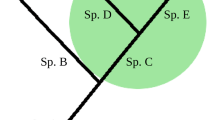Abstract
The Kripkean conception of natural kinds (kinds are defined by essences that are intrinsic to their members and that lie at the microphysical level) indirectly finds support in a certain conception of a law of nature, according to which generalizations must have unlimited scope and be exceptionless to count as laws of nature. On my view, the kinds that constitute the subject matter of special sciences such as biology may very well turn out to be natural despite the fact that their essences fail to be microphysical or micro-based. On the causal conception of natural kinds I privilege, the naturalness of a kind is a function of the fact that it figures prominently in at least one causal law. However, there is a strong tendency prevailing among contemporary philosophers to assume that, in order to count as proper laws generalizations must be expectionless. Since most generalizations tracked down by the special sciences turn out not to fulfill these criteria, what this conception of a law implies is that most of the generalizations the special sciences trade in are not proper laws. It follows that, on this view, most if not all of the kinds the special sciences dealing with turn out not to constitute natural kinds, understood as kinds to which bona fide laws apply. In order to establish that the non-microstructurally defined kinds that fall within the domain of enquiry of the special sciences are eligible for the status of natural kind, I must therefore establish that generalizations needn’t have unlimited scope and be exceptionless to count as laws of nature. This is precisely what I seek to do in this paper. I begin by arguing that the question “what is a law of nature?” is most naturally interpreted as the question “what features must generalizations exhibit in order to ground scientific explanations?” and by offering reasons to believe that generalizations needn’t be exceptionless and have unlimited scope to play the crucial role laws have been thought to play in scientific explanation. Drawing on Sandra Mitchell [Mitchell, S. (2000). Philosophy of Science, 67, 242–265] and James Woodward’s [Woodward, J. (1997). Philosophy of science, 64 (proceedings), 524–541; Woodward, J. (2000). British Journal for the philosophy of science, 51(2), 197–254; Woodward, J. (2001). Philosophy of science, 68, 1–20] work, I subsequently develop an alternative account of the criteria generalizations must satisfy in order to count as laws of nature, which at least some of the generalizations of the special sciences turn out to fulfill. I thus give credence to the idea that at least some of the kinds that fall within the domain of the special sciences figure in laws of nature, and I thereby restore the possibility that some special science kinds deserve to be deemed natural.
Similar content being viewed by others
References
Beatty J. (1995). The evolutionary contingency thesis. In: Wolters G., Lennox J.G. (eds) Concepts, theories, and rationality in the biological sciences. Pittsburg, University of Pittsburg Press, pp 45–81
Brandon, R. (1996). Reductionism versus holism mechanism. In Concepts and methods in evolutionary biology. Cambridge: Cambridge University Press.
Cartwright, N. (1983). How the laws of physics lie. Oxford: Clarendon Press; New York: Oxford University Press.
Davies P. (1995). Algorithmic compressibility, fundamental and phenomenological laws. In: Weinert F. (eds) Laws of nature: Essays on the philosophical, scientific and historical dimensions. Berlin, Walter de Gruyter, pp 248–267
Earman J., Roberts J. (1999). Ceteris paribus, there is no problem of provisos. Synthese 118: 439–478
Griffiths P.E. (1999). Squaring the circle: Natural kinds with historical essences. In: Wilson R.A. (ed) Species: New interdisciplinary essays. MIT Press, Cambridge, MA
Mitchell S. (2000) Dimensions of scientific law. Philosophy of Science 67: 242–265
Pietroski P., Rey G. (1995). When other things aren’t equal: Saving ceteris paribus laws from vacuity. British Journal for the Philosophy for the Philosophy of Science 46: 81–110
Ross D. (2000). Rainforest Realism: A Dennettian theory of existence. In Dennett’s philosophy: A comprehensive assessment, Cambridge, Mass, MIT Press.
Salmon W.C. (1971). Statistical explanation and statistical relevance. Pittsburgh, University of Pittsburgh Press
Salmon W.C. (1984). Scientific explanation and the causal structure of the world. Princeton, Princeton University Press
Salmon W.C. (1989). Four decades of scientific explanation. In: Kitcher P., Salmon W. (eds) Scientific explanation, Minnesota Studies in the Philosophy of Science 13. Minneapolis, University of Minnesota Press, pp 3–195
Woodward, J. (1997). Explanation, invariance, and intervention. Philosophy of Science, 64 (Proceedings), S24–S41.
Woodward J. (2000) Explanation and invariance in the special sciences. British Journal for the Philosophy of Science 51(2): 197–254
Woodward J. (2001) Law and explanation in biology: Invariance is the kind of stability that matters. Philosophy of Science 68: 1–20
Woodward J. (2002). Making things happen: A theory of causal explanation, Oxford.
Author information
Authors and Affiliations
Corresponding author
Rights and permissions
About this article
Cite this article
Karbasizadeh, A.E. Revising the concept of lawhood: special sciences and natural kinds. Synthese 162, 15–30 (2008). https://doi.org/10.1007/s11229-007-9165-x
Received:
Accepted:
Published:
Issue Date:
DOI: https://doi.org/10.1007/s11229-007-9165-x




